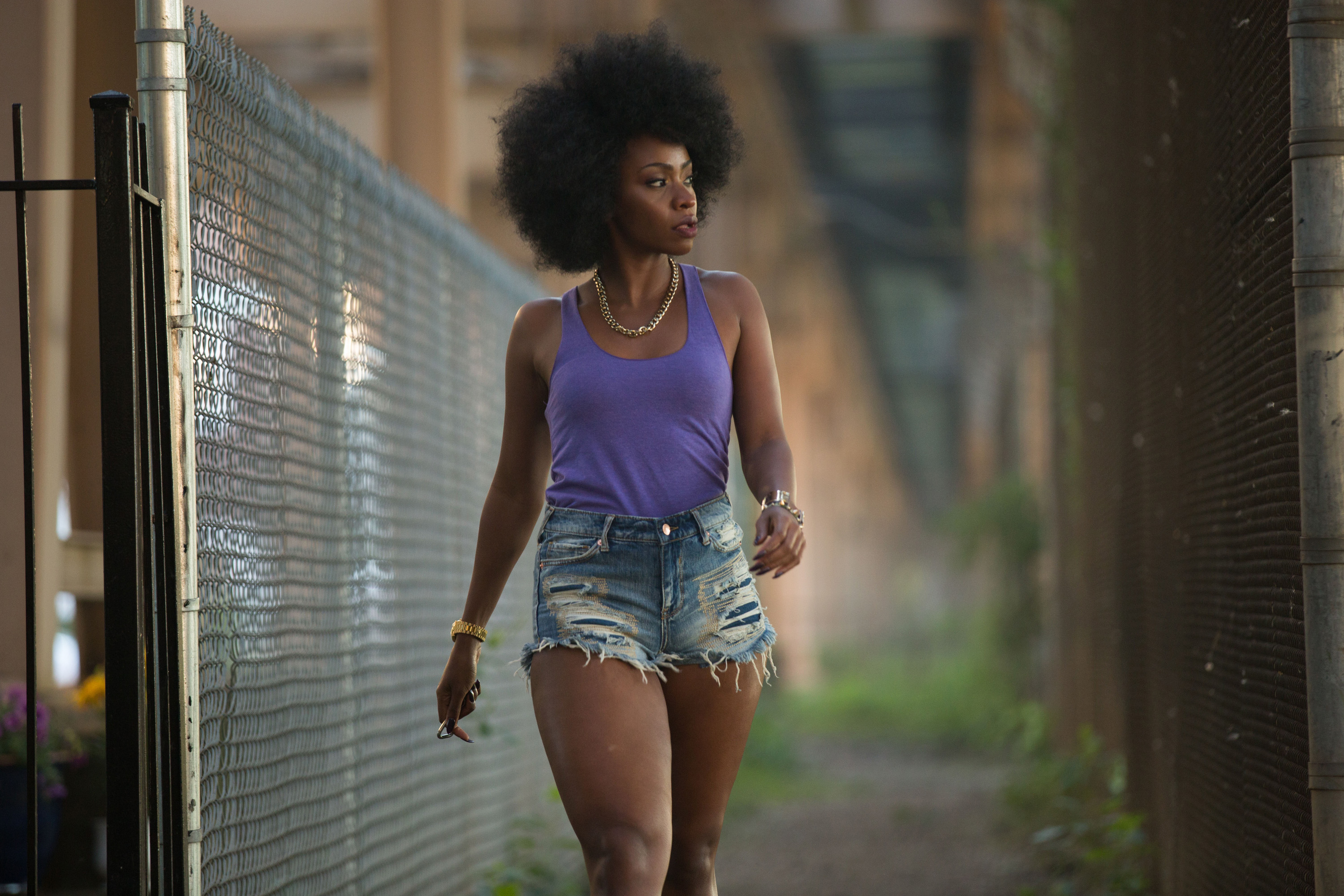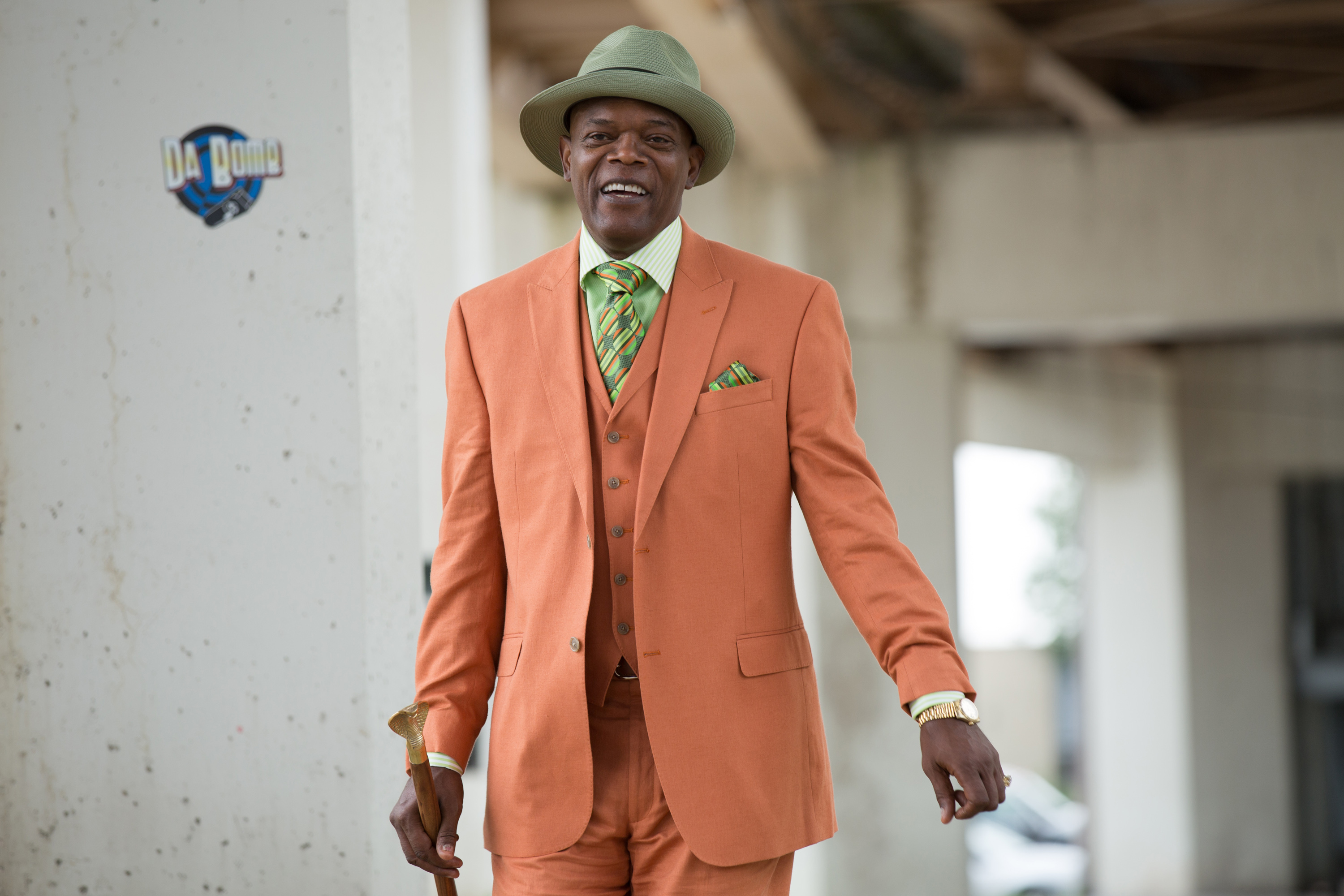WASHINGTON — “No peace, no piece.”
With one subversive tagline, Spike Lee whacks us with his daring new premise: Can peace-seeking women reduce gun violence by denying sex to their trigger-happy men?
That’s the concept of the urgent new flick “Chi-Raq,” a true Spike Lee Joint in every sense of the phrase: gutsy, stylized and controversial, less pushing the envelope as it is ripping it wide open.
Cowritten with Kevin Willmott, Lee’s script is adapted from Aristophanes’ Ancient Greek play “Lysistrata” (411 BC), a comedy about a woman who persuades the women of Greece to withhold sexual privileges from their husbands until they agree to end the Peloponnesian War.
In Lee’s adaptation, an innocent child is killed by a stray bullet on the south side of Chicago, causing Lysistrata (Teyonah Parris) to organize a group of women (Angela Bassettt, Jennifer Hudson) to withhold sex until rival gang leaders (Nick Cannon and Wesley Snipes) stop the drive-by shootings.
“A lot of people are asleep, a lot of people are not aware of what’s happening in their own country, and hopefully this film will spark dialogue and discussion so we can try to rectify major problems which are killing us, no pun intended,” Lee tells WTOP in a joint interview with Parris.
While Lee hopes the film will spark social dialogue, it’s important to note that the script’s dialogue is often spoken in a poetic, rhyming verse: “Cops and gangs, black and brown caught in the middle. Insane! I can hear Nero fiddle.” Unlike the more realistic “Malcom X” (1992), this highly stylized approach occasionally rings over-the-top — particularly when Lysistrata seduces a general in Confederate flag underwear while straddling a cannon — but the absurdity helps to drive home very real points.
“We as a country have to do something about guns. I’m not talking about taking away anybody’s Second Amendment rights, but just logical things we can do to make America a safer country and not bow down before the NRA and the gun manufacturers,” Lee says.
As the film’s antagonists fire military-style weapons at each other in the streets of an American city, the title “Chi-Raq” speaks for itself. In truth, the term is pulled from everyday lingo on Chicago’s streets, as residents articulate the gun violence plaguing the Windy City on a daily basis.
“Every day we were surrounded on set by people in the community. They were very supportive. They certainly embraced us. We worked with this organization Purpose Over Pain, which is a bunch of mothers and men who have lost loved ones to gun violence, so having their energy on set with us, it certainly motivated me to make sure I told the story well,” Parris tells WTOP.
Lee has taken some heat for using the term “Chi-Raq,” but it’s no different from characters in HBO’s “The Wire” shouting “WMD” as code for Baltimore drug deals as the Iraq War raged overseas. In fact, several actors from “The Wire” make cameos in “Chi-Raq,” including Felicia Pearson aka Snoop and Isiah Whitlock, Jr. aka Clay Davis, who appears briefly to deliver his signature line.
The familiar faces — Dave Chappelle, Jennifer Hudson, Angela Bassett, Nick Cannon, Wesley Snipes, Samuel L. Jackson — make for a collaborative effort shot in just five weeks from June 1 to July 9.
“Just being with so many artists who were so excited and eager to not only tell this story, but to make sure we told it well. … Being with legends in cinematic and theatrical arts, I certainly learned a bunch from them. … Not only did I learn by simply watching, but by doing,” Parris says.
Despite the obvious starpower in the supporting cast, it is the rising star of Parris that shines the brightest. Parris delivers a modern-day Foxy Brown after bursting on the scene as secretary Dawn Chambers in AMC’s “Mad Men” (2012-2015). She then caught Lee’s eye as CoCo Conners in “Dear White People” (2014), where she shared the screen with Tessa Thompson (“Selma,” “Creed”).
“First I said, ‘Who is this?’ Then I said, ‘I wanna find out who she is and possibly work with her.”

“To have this strong female character carry this movie, that’s special. You don’t get to see that often. … She finds her courage and her ability to lead in her mentor, Miss Angela Bassett, who plays Miss Helen. I think it’s important to see that it’s necessary to have people in the community, elders in the community, help shape and guide our young people when they get off track,” Parris says.
Wise elders have long been the light of Lee’s cinema, most memorably Ruby Dee and Ossie Davis. Bassett knows this territory well, recalling the wise parental figures that she and Laurence Fishburne provided for Cuba Gooding Jr. in John Singleton’s classic “Boyz N The Hood” (1991). Just as Fishburne delivered a gentrification lesson in “Boyz,” Bassett erupts over insurance in “Chi-Raq.”
While “Boyz N The Hood” opened with a powerful “STOP” sign — asking us to stop the violence and increase the peace — “Chi-Raq” opens with the flashing words, “THIS IS AN EMERGENCY,” kicking off a motion graphics opening credit sequence set to Cannon’s “Pray 4 My City.” The track’s socially conscious lyrics aspire to the political commentary heights of a Kendrick Lamar, brilliantly juxtaposed against an ensuing scene where a profane club performance of violent lyrics sparks a hail of bullets.
Lee’s elders have plenty to teach the hormone-raging youth, personified by rival gang leaders Chi-Raq (Cannon) and Cyclops (Snipes). Sharks & Jets? Bloods & Crips? Meet the Spartans & Trojans.
Cutting through the chaos is John Cusack’s priest, who delivers a rousing eulogy for a drive-by victim, a second instance of Cusack “Love & Mercy” this year. “What makes someone a target isn’t the shooter. What makes someone a target is the community that surrenders to fear,” he proclaims.
“The approach was gonna be, let’s indicate, let’s shed light on the issues that put her in the coffin. And John Cusack gives a great performance in that scene. I’d like people to know that his character is based upon a real live person, Father Michael Pfleger, who is a white Roman Catholic priest, and that’s his church in that scene, Saint Sabina on Chicago’s south side,” Lee says.
The handling of Cusack’s character epitomizes the deceptively fair approach of Lee’s work, which is too often misread by close-minded detractors eager to shout “race-baiting.” Rather than merely “playing the race card” — a term that itself has become cliché in its ignorance — Lee’s best films admirably feature colorblind moral messages with a painstaking attempt at fairness amid the chaos, ensuring that there’s plenty of blame to go around and all of us, quite literally, have skin in the game.
It’s easy to credit Lee’s masterpiece “Do the Right Thing” for the advancement of people of color. Entire textbooks have examined the film’s primary purpose in this regard, from depicting Radio Raheem as a pre-Rodney King victim of police brutality, to a pizza-parlor debate between Lee and John Turturro about pop culture heroes. It also just happened to be the first date of a future President Barack Obama and First Lady Michelle Obama in 1989. A lot can happen in 20 years.
Yours Truly also believes that Lee doesn’t receive enough credit for his painstakingly fair depiction of white characters. Look no further than a scene where Giancarlo Esposito (“Breaking Bad”) and Martin Lawrence (“Martin”) ridicule a white neighbor played by John Savage (“The Deer Hunter”). The scene is set up as a classic white vs. black clash between Magic Johnson and Larry Bird fans, but Lee ironically gives Savage the sympathy, countering calls for him to move back to Massachusetts by stating, “I was born in Brooklyn,” as Lee’s camera symbolically looks down upon the angry group.
This is how you win converts, ladies and gentlemen, by maintaining an inherent fairness in your work whilst raging for social change. This same principle applies to in-your-face moments, like the film’s seminal racism montage as multiple ethnicities break the fourth wall to spit offensive stereotypes.
NOTE: Video below contains explicit and offensive language to drive home an important point.
Just as that montage needed Jackson to stop the madness — “Time out! Y’all take a chill. Ya need to cool that sh*t out! And that’s the double truth, Ruth!” — “Chi-Raq” again casts Jackson as a smooth narrator with the moral high ground. While “Do the Right Thing” opened with Jackson telling the audience, “Wake up,” Jackson similarly closes “Chi-Raq” with an emphatic: “Wake up!”

This final plea shows Jackson in front of a giant American flag, recalling George C. Scott’s iconic scene in the superb war biopic “Patton” (1970), which won seven Oscars including Best Picture.
“That’s an homage to my main man Francis Ford Coppola,” Lee says with a smile.
No doubt, when the film history books are written, Lee will be analyzed just as furiously as Coppola, two auteurs desperately trying to make sense of senseless violence in the world around them. While Coppola ended “The Godfather” with a symbolic door closing on Diane Keaton, Lee presents “Chi-Raq” as a critique on gender politics, opening the door to women with the power to ignite change.
“Spike is a visionary, but he does not always let us in on what that vision is,” Parris says. “That was certainly my most challenging part, having to surrender my ideas of what I thought I needed in order to deliver, and just having to trust this guy who’s been doing this for over 30 years.”
WTOP invited Lee to examine his decades of filmmaking in a closing Q&A of rapid-fire filmography:
‘She’s Gotta Have It’ (1986)
The first film.
‘School Daze’ (1988)
The second film.
‘Do the Right Thing’ (1989)
The third film! You’re asking me them in order, what am I gonna say? (Parris: “Change the order!”)
Alright, ‘Malcom X’ (1992)
Denzel Washington.
‘Do the Right Thing’ (1989)
The first film where I was comfortable directing actors.
‘Clockers’ (1995)
That was a film that was supposed to be directed by Martin Scorsese starring Robert DeNiro, and they decided to do “Casino” instead, and Marty asked me to that.
‘She’s Gotta Have It’ (1986)
Shot in 12 days.
‘Jungle Fever’ (1991)
Ruby Dee, Ossie Davis, Wesley Snipes, Annabella Sciorra, Sam Jackson as Gator.
‘He Got Game’ (1998)
Ray Allen, Denzel.
‘Inside Man’ (2006)
Another great film we did with Denzel Washington, in fact the last one with him. It’s been a minute.
‘When the Levees Broke’ (2006)
It took the United States five days to rescue its own citizens on the mainland of the continent.
Which brings us full circle to the opening song on the “Chi-Raq” soundtrack:
Please pray for my city
Too much hate in my city
Too many heartaches in my city
But I got faith in my city.
Listen to the full interview with Spike Lee and Teyonah Parris below:







